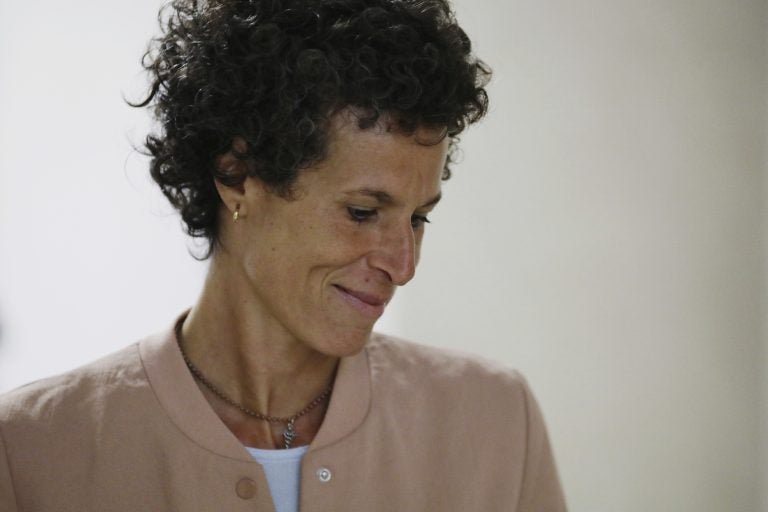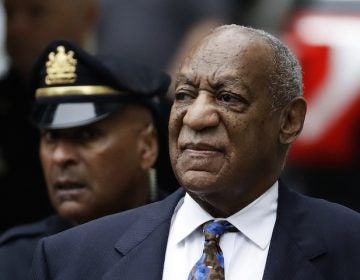Cosby’s defense lawyer to main accuser: ‘What are you doing here?’
Bill Cosby’s primary accuser returned to the witness stand on Monday and was peppered with wide-ranging questions from the entertainer’s lead defense lawyer.
Listen 1:52
Andrea Constand arrives to resume her testimony during Bill Cosby's sexual assault retrial at the Montgomery County Courthouse in Norristown, Pa., Monday, April 16, 2018. (Dominick Reuter/Pool Photo via AP)
Bill Cosby’s primary accuser stepped down from the witness stand following more than seven hours of fielding intense questions over two days in a Norristown courtroom.
Andrea Constand’s credibility is seen as a crucial test for jurors. Last June, a different panel of jurors could not unanimously agree on whether her story about Cosby rose to the level of a criminal conviction, prompting the judge to declare a mistrial and allowing Cosby to walk free.
Cosby’s defense team peppered Constand with wide-ranging questions about emails she sent to acquaintances more than a decade ago, whether she violated the terms of a previously confidential civil settlement, and why she spent time with Cosby in a Connecticut hotel just before the alleged assault.
Constand, who says Cosby drugged and assaulted her at his home in 2004, told the court in her second day on the witness stand that emails the defense team dug up in which Constand solicited $65 donations as part of business operation resembling a pyramid scheme were barely memorable.
“I didn’t know anything about that stuff. I was an athlete my whole life. I was just helping a friend,” she said.
Defense attorney Tom Mesereau pressed on, telling jurors Constand had advanced in the online business by convincing one person to donate. She responded that the operation was “a new internet networking thing I didn’t know much about.”
Mesereau was not satisfied, and he wanted to sharpen the focus on why Constand had any involvement, but prosecutors objected to the repetitive nature of the questions. Judge Steven O’Neill agreed, sustaining the objection.
This email will never be in front of this jury,” O’Neill said. “They don’t have to determine the nature of the email.”
Drilling into 16-year-old emails over Constand’s limited participation in a questionable online business operation may seem far away from the sexual assault at the center of the trial. Legal observers, however, say it is an attempt to cement Constand as a desperate, cash-strapped person who framed Cosby with a false claim to extract a nearly $3.4 million civil settlement.
Establishing that financial motive, defense lawyers hope, will shatter Constand’s credibility and raise doubt about whether the 2004 episode happened the way she says it did.
The settlement payout, which before the trial was confidential, became another focal point of the morning’s questions.
Mesereau zoomed in on one particular section of the 2006 agreement: both Constand and Cosby agreed that it did not represent “any liability, wrongdoing or fault.”
“Why did you sign off on a document that had that provision?” Mesereau asked.
Constand said the civil litigation “tore my family apart,” she said, adding: “We just wanted it over.”
The agreement Constand signed also stipulates that she would not initiate a criminal complaint against Cosby over the 2004 alleged sexual assault that prompted the 2005 civil lawsuit.
“So, what are you doing here?” Mesereau asked.
Prosecutor Kristen Feden quickly objected, and the judge shut down Mesereau’s line of questioning.
When it was the prosecution’s turn to follow up with Constand about what had been talked about with Mesereau, Feden pointed out that there was a catch: If authorities launched an investigation and subpoenaed Constand, as law enforcement in Montgomery County had, that would not violate the settlement.
“Would you agree that that was in pursuant to a law enforcement investigation by a state, the Commonwealth of Pennsylvania?”
“Yes,” Constand replied.
Earlier, Mesereau discussed a time before the alleged assault, in November 2003, when Cosby invited Constand to the Foxwoods casino in Connecticut, where Cosby was performing.
While at Foxwoods, Constand stopped by Cosby’s hotel suite to pick up some baked goods from him.
“Did you think it was appropriate to go to a married man’s room in a hotel in Connecticut?” Mesereau asked.
She did not consider the encounter improper, Constand told the jury, and it had been a short visit, about ten minutes. But during that time, she said Cosby summoned her into his bedroom, where she sat on the corner of the bed. Cosby then laid down next to her. Constand said she wasn’t sure why and thought perhaps he was not feeling well. He laid there in silence. She left for her own room not long after.
When Meserau finished, Feden went back to the 2004 incident to which Cosby’s fate is tied.
“I was very limp,” Constand told jurors, recalling how she felt after she said Cosby had drugged her with a powerful intoxicant. “And I wasn’t able to fight him in any way.”
She confessed, at one point, that her prior statements do not all line up perfectly. She had some contradictory statements to police after the incident, including the exact date it allegedly occurred and how long before the episode she had met Cosby.
“That’s right, sir. I was mistaken,” said a calm and unwavering Constand. “I believe I have been consistent, but mistaken in some ways.”
Drawing on a defense argument raised more vigorously during last year’s trial, defense lawyers said Constand had given Cosby the impression she was interested in him romantically before and after the alleged assault, exchanging some 100 calls following the 2004 incident.
“Why you calling him on Valentine’s Day after you say you were assaulted?” Mesereau asked.
Constand has long maintained that her calls to Cosby were always business related. Cosby was once a Temple trustee interested in the school’s sports programs, including the women’s basketball team, which employed Constand.
Gianna Constand, Andrea’s mother, also testified on Monday, telling the jury of seven men and five women that her daughter “was not the same” when she came back home to Canada after the alleged assault.
“In the night, we would hear her screaming. She would be screaming in her sleep,” she said. “I knew something was wrong, but I couldn’t put my finger on it.”
The jury heard a conversation Gianna Constand recorded with Cosby in which she asks the comic legend what kind of drugs he had given her before the incident that is now the heart of the criminal trial.
“Oh, no, no, no, no,” Cosby said in the recording. “We can, we can talk about what you asked for later.”
Constand has said she took the three blue bills under the assumption it was herbal, and Cosby has maintained it was Benadryl, but investigators have long thought the pills to be much stronger given the immediate and powerful affect it had on Constand before prosecutors say she was fondled against her will.
After Cosby brushed off Gianna Constand’s demand, she told the jury she was enraged.
“My eyes were like two pools of blood. I was that angry trying to get things out of him,” she said. “He said he felt like he was a dirty old perverted man, she said, saying: “I felt he surrendered and admitted to me that he was a sick man, and it took Andrea to stop him, was his last words. Whatever that meant.”
WHYY is your source for fact-based, in-depth journalism and information. As a nonprofit organization, we rely on financial support from readers like you. Please give today.




